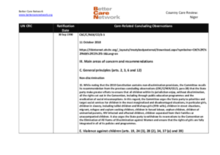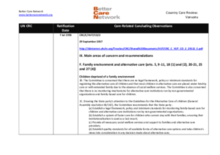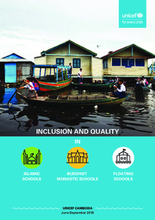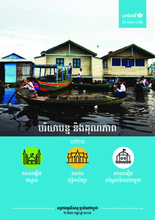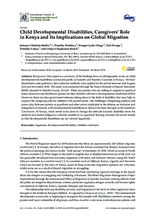Displaying 161 - 170 of 462
This country care review includes the care related Concluding Observations adopted by the Committee on the Rights of the Child and the Committee on the Rights of Persons with Disabilities as part of its examination of Niger's initial reports, as well as other care-related concluding observations, ratification dates, and links to the Universal Periodic Review.
This country care review includes the care-related Concluding Observations adopted by the Committee on the Rights of the Child and the Committee on the Rights of Persons with Disabilities.
This country care review includes the Concluding Observations for the Committee on the Rights of the Child and the Committee on the Rights of Persons with Disabilities. The Committees' recommendations on the issue of Family Environment and Alternative Care as well as other care relevant issues are highlighted.
This country care review includes the care-related Concluding Observations adopted by the Committee on the Rights of Persons with Disabilities.
This country care review includes the care-related Concluding Observations adopted by the Committee on the Rights of the Child and the Committee on the Rights of Persons with Disabilities.
This research study was commissioned to generate a better understanding of three school communities in Cambodia: Islamic schools, Buddhist monastic schools, and floating schools with a focus on identifying challenges in delivering quality and inclusive education.
This research study was commissioned to generate a better understanding of three school communities in Cambodia: Islamic schools, Buddhist monastic schools, and floating schools with a focus on identifying challenges in delivering quality and inclusive education.
This current systematic literature review aims to examine what is known about foster parents' needs, satisfaction and perceptions of foster parent training.
This Resolution on "empowering children with disabilities for the enjoyment of their human rights" was adopted by the UN Human Rights Council on 22 March 2019. The Resolution makes mention of the particular vulnerability of children with disabilities to institutionalization, reaffirms the importance of a family environment for all children, and calls upon States to provide necessary support services to children and families so as to prevent institutionalization and family separation, encouraging States to "undertake every effort to provide alternative care within the wider family and, failing that, within the community in a family setting" where the immediate family is unable to care for the child.
This paper is a summary of the findings from an ethnographic study on child developmental disabilities conducted partly in Nairobi and Kiambu Counties in Kenya.

